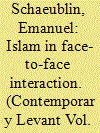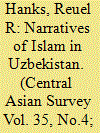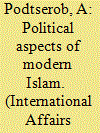| Srl | Item |
| 1 |
ID:
169283


|
|
|
|
|
| Summary/Abstract |
Zakat is the Islamic obligation to give away a share of one’s moveable wealth for the sake of the community—primarily supporting people in need. Based on fieldwork in the Palestinian city of Nablus (2013–2014) where institutional channels for distributing zakat had become blocked due to security crackdowns in 2008, this article analyses direct zakat practices where givers and receivers confront one another in face-to-face interaction. In Nablus, openly displayed material want was assumed to ‘expose’ people living in poor households as well as their relatives and neighbours. Against this background, direct zakat manifested itself as discreet gestures of ‘covering’ need, while people not asking openly for support tended to be praised for their shyness and piety. In direct zakat transfers, people actively cared for how they appeared to one another in social interactions. This ‘ethical work’ of presenting oneself involved reading signs, embodying Muslim virtues and invoking God as the sole source of material provision. Considering the Islamic tradition’s presence within social interactions, this article seeks to understand how Muslim piety exceeds the individual and how the moral responsibility to cover the needs of others is socially distributed.
|
|
|
|
|
|
|
|
|
|
|
|
|
|
|
|
| 2 |
ID:
149736


|
|
|
|
|
| Summary/Abstract |
Under the late Islom Karimov, the authoritarian regimes in Uzbekistan created dual myths of Islam. On the one hand, Islam was encompassed in the larger context of manaviyat (spirituality), and on the other, a myth of an Islamic ‘extremism’ that challenges security and stability on a regional scale was cultivated. This ‘threat’ is so pervasive and pernicious that it commands the authoritarian nature of governance that characterizes the Karimov era, leading to a Janus-state syndrome in which Islam is simultaneously cast as a sine qua non of national myth and an existential threat to state security. This article examines the mythology of political Islam in Uzbekistan and the Janus-state syndrome resulting from the duality of Islamic myth. It argues that a civil society cannot flourish in Central Asia unless moderate Islamic groups are allowed to build the very social structures that provide the foundation for interaction, peaceful coexistence, toleration and pluralism.
|
|
|
|
|
|
|
|
|
|
|
|
|
|
|
|
| 3 |
ID:
151597


|
|
|
|
|
| Summary/Abstract |
UNTIL THE EARLY 1960S, modern political Islam did not have much influence in the Arab world or in the Middle East. There was an ongoing conflict in the region between nationalists, who were supported by the Soviet Union, and conservative regimes, which were supported by the West. Over time, radical movements managed to build a political consensus to strengthen their influence. However, the gradual escalation of insoluble problems triggered the onset of the destruction of political nationalism. In addition, radical public trends outwardly emulated European radicalism.
|
|
|
|
|
|
|
|
|
|
|
|
|
|
|
|